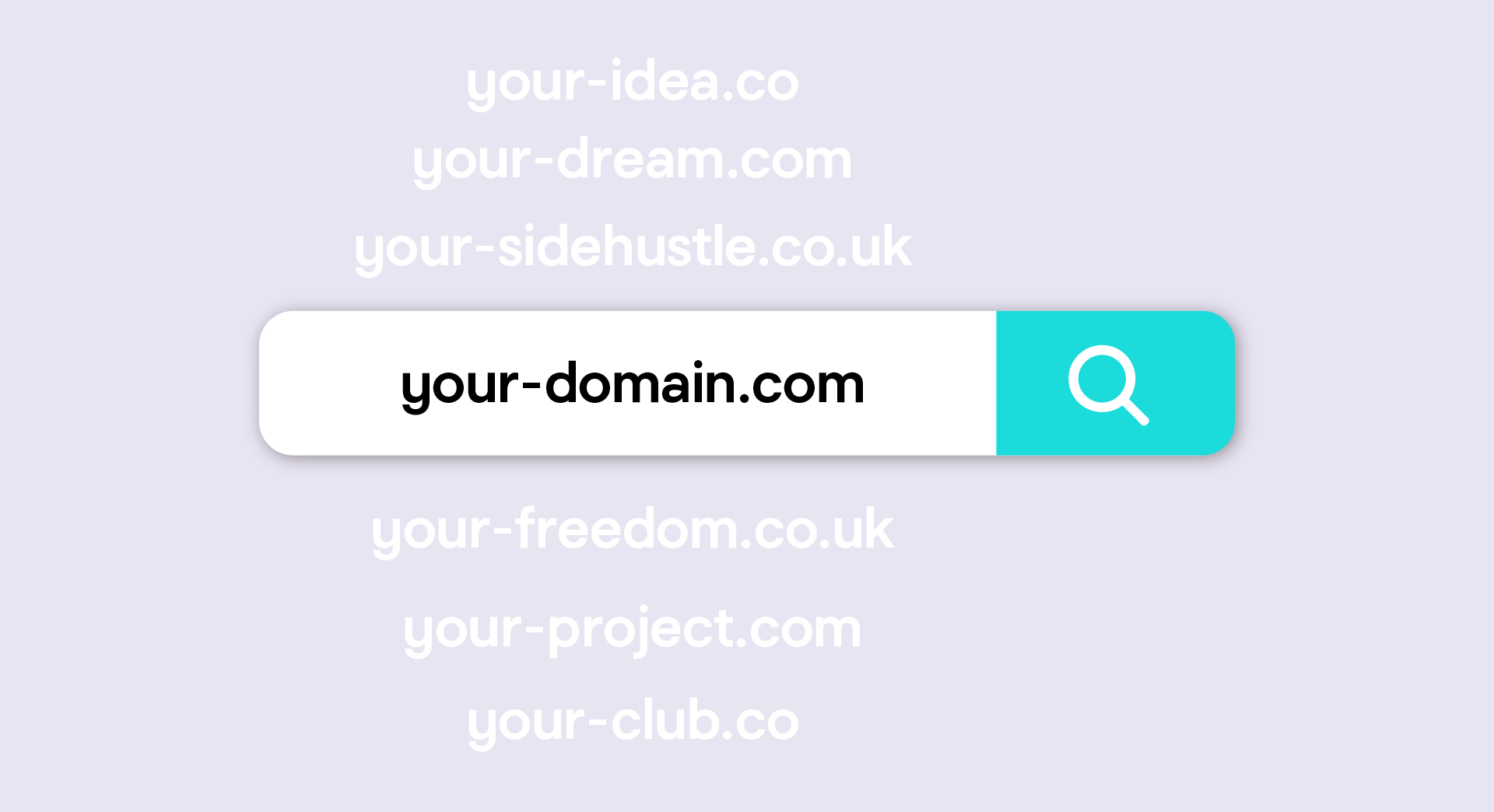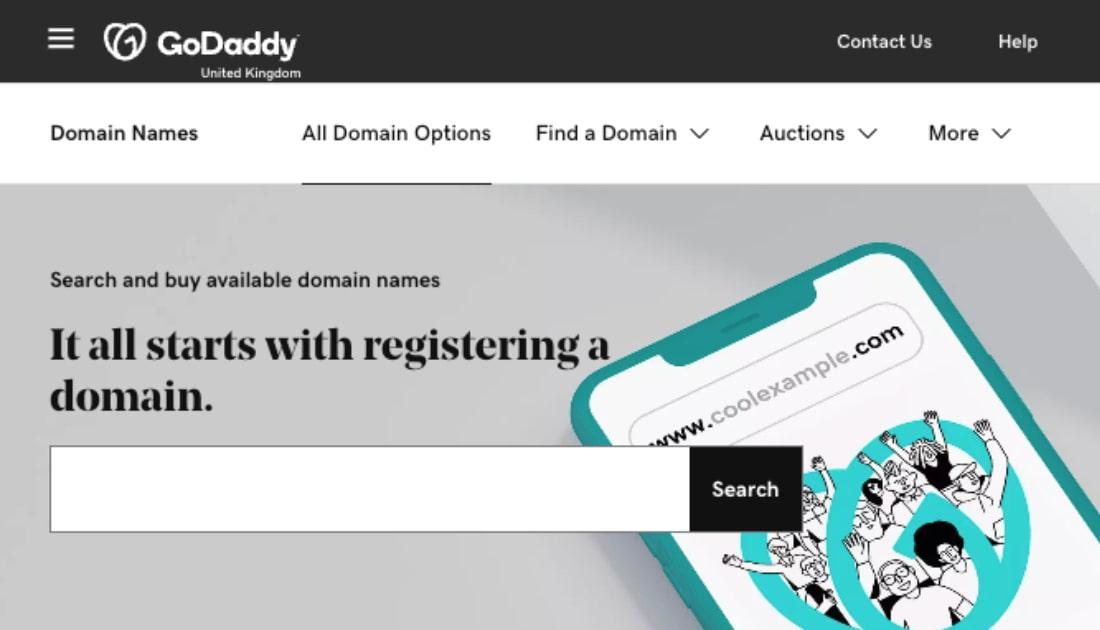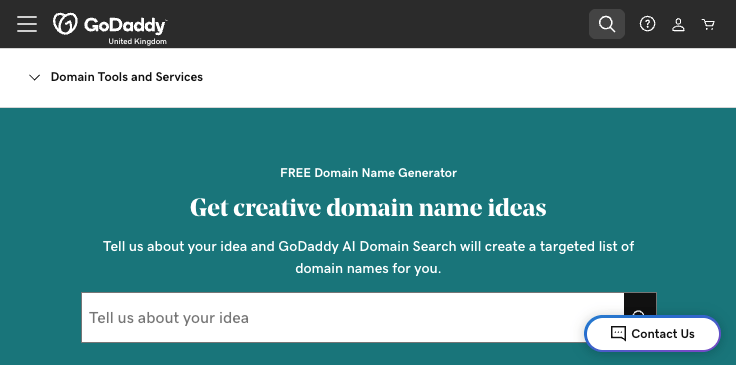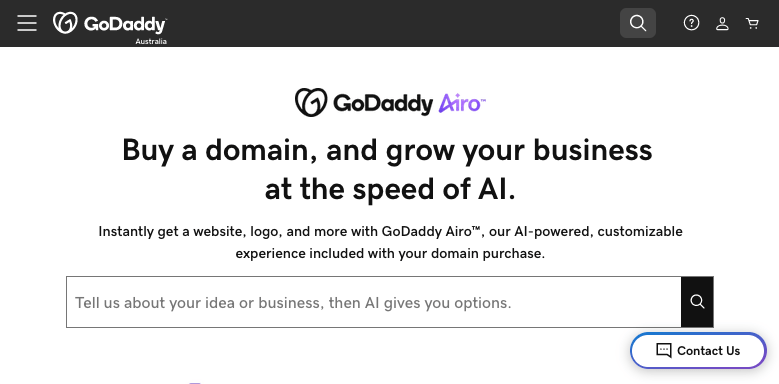Choosing a domain name is like choosing a company name — it requires a lot of thought and consideration. Your domain name, sometimes called your website name, is your identity on the web. You want to make sure you choose a domain that not only fits your business but is also easy to find and promote.
However, it can be hard to know what makes a good domain name. If you need help choosing a domain name, read on.
Editor's note: Tell us about your idea and GoDaddy Airo will serve up a domain name, logo, website, social media handles and more. All for the price of your domain name.* Try it now! TechRadar Pro calls Airo a "game-changer for small businesses."
What makes a good domain name?
A good domain name is unique, short, and easy to remember. A good domain name avoids using other people’s trademarks, complicated words and words that have similar spellings to other words (too/to for example).
Now let's check out our pro tips for choosing a domain name you'll love for years to come.
Related: What is a domain name? + 12 other domain name questions answered
1. Choose a domain name that is short and easy to type

Finding a domain name that’s easy to type is critical to online success. If you use abbreviations (u instead of you) or unusual spellings (xpress instead of express), it might be harder for customers to remember the name of your site. This an important consideration when choosing a website name. Also consider the possible value of the domain you will choose, in case that you would like to list the domain for sale later on. GoDaddy Auctions is a great medium for buying and selling domain names as investments or as products.
Find the perfect domain name now:
2. Choose a memorable domain name
There are millions of registered domain names, so it’s essential to choose one that’s memorable.
Make your domain name a magnet.
It should be catchy, unique and stand out from the crowd.

Certain words and themes in a domain name can trigger specific responses – consider the emotional impact. A playful twist can ignite curiosity, while a more formal approach builds trust and reliability. Ideally, your domain should hint at what’s on offer and make a clear first impression.
Once you’ve come up with a name, share it with close friends to make sure it sounds appealing and makes sense to others.
If they, or even you, easily forget the domain name you’re considering, then it’s likely that others will have the same problem.
3. Choose a domain name without numbers and hyphens
Numbers and hyphens in domain names are often misunderstood — people who hear your website address don’t know if you’re using a numeral (5) or it’s spelled out (five). If you’re using hyphens, people might put them in the wrong place or forget them altogether.
Numbers and hyphens complicate your domain name, making it harder to remember and type. That makes your business harder to remember.
4. Consider using keywords in your domain name

You might want to use keywords that describe your business and the services you offer. For example, if you’re a plumber you might want to include the word plumber in your domain name. However, it can be hard to find a suitable domain name which includes keywords.
Search engine optimization (SEO) tools like Moz, SEMrush and the free Google Keyword Planner can help you come up with keywords to work into your domain name.
To spark more creativity, you might like to try online thesaurus and word exploration tools. WordHippo is one such resource, which helps you find synonyms and other words related to your hinted suggestion.
If you’re just starting out, finding the right domain name can make for the perfect head start in your online journey. If you do find a keyword domain name that’s suitable, it isn’t guaranteed to give you a search engine rankings boost. On the upside, it will let people know what you do.
5. Choose a domain name that targets your area
If your business is local, consider including your city or area in your domain name to make it easy for local customers to find and remember.
As with including a keyword in your domain, it may be hard to find a suitable domain which includes your location.
However, it will let people know that you operate in their local area. You may be able to indicate your location using an appropriate domain name extension. See the section on choosing a domain extension below.
6. Consider a branded domain name

As it’s difficult to get a good domain name that includes a keyword and your location, you should also consider opting for a branded domain name.
This is the approach taken by most of the world’s biggest online businesses (think Amazon.com).
This might be described as a sort of reverse branding. That is: find an available and affordable domain name first, then build a brand identity around that lucky find after. You’re coming up with your brand name and domain name at the same time — they are to become, in effect, one and the same thing.
Why spend hours brainstorming a unique name only to discover it’s already taken? By starting with the domain, you’re guaranteed a digital home base that’s catchy and fits your business. It also saves you from settling for a less-than-ideal name.
Don’t get too hung up on whether your branded domain name sounds like it’s the perfect name for a business site. After all, how many people would have said Amazon.com was a good domain name for a business website before it launched?
If you decide to opt for a branded domain name, you’ll still need to make sure it follows the other rules we’ve laid out in this document.
You can use GoDaddy’s domain name generator to help you create a branded domain.
7. Research your domain name before choosing it

Look at the competition. See what they're doing with their domain name choices — are there any common words or themes? Analyzing what others in your industry are using can give you valuable ideas about what works for customers (and what might not).
Remember that there’s more to setting up an online business than simply buying a domain. Make sure the name you’ve selected isn’t trademarked, copyrighted or being used by another company. You can find out who owns a domain using this tool.
This step will stop you from accidentally stepping on anyone else's toes and avoids any legal headaches. It may also avoid confusing customers further down the road.
8. Secure your domain name fast
Domain names sell quickly. Thankfully, many are inexpensive, so register a domain name as soon as possible. This is probably the most important of our domain name tips – if you’ve found one you like, get it as soon as you can or someone else might snap it up!
If you’re having trouble finding an available name, domain registrars like GoDaddy will suggest alternative names during your domain search to help you find the perfect name.
If your desired name is taken, you can use a domain backorder service to be notified as soon as it expires and increase your chances of getting it. This is probably the most important of our domain name tips – if you’ve found one you like, get it as soon as you can or someone else might snap it up!
9. Choose an appropriate domain name extension

Extensions are suffixes, such as .com or .net, at the end of web addresses. These can have specific uses, so make sure to choose one that works for your business. The .com domain extension is far and away the most popular, but it can be tough to get a short and memorable .com domain name because it’s been around for so long.
However, there are loads of other domain extensions available.
Why not consider something other than .com?
You can make it a success by getting creative. Novel top-level domain extensions, from .ai to .xyz, offer endless possibilities.
In fact, some people get really creative with their domain names:
- The American rapper Will.i.am uses .am, which is actually the country-code TLD for Armenia, for the self-titled web address of his online fan page in Armenia.
- The UK-based music tracking service Last.fm chose .fm as their domain extension. While .fm is the official ccTLD of the Federated States of Micronesia, anyone may register a .fm domain name.
- Meet.me, an app that allows people to connect with other users located near them, uses .me (the ccTLD for Montenegro) to fully express its brand name in its domain name.
Then there are geographic extensions, such as .london, and industry-specific extensions such as .pub, .cab and .plumbing. These can help your business stand out in a crowded online marketplace.
You can find the complete list of domain extensions here.
Related: Is a .com domain better?
10. Protect and build your brand
A domain name that matches your business or flagship product name works to create a powerful one-two branding punch for you.
But while a good domain can be a launching pad for a new business, established companies might have different considerations.
This begs the question:
Does the domain name always need to match the company name?
While it's not necessary for your domain name to match your business name exactly, having consistency between the two could make it easier for people to find you online. When your website address mirrors your company name, customers can easily recall and type it in, leading them directly to your digital doorstep.
If you already have a name in mind, it’s a smart idea to register the business first, then go out and buy the matching domain. This secures your ownership and cuts out the risk of having to pay a high price to reclaim your name later on.
To protect your brand, consider purchasing in bulk various domains with different extensions, as well as misspelled versions of your domain name. This prevents competitors from registering other versions and ensures your customers are directed to your website, even if they mistype it.
Having multiple versions of the same domain name across different extensions can help you protect against cybersquatting and the damage it can do to your brand.
Bonus tip: Choosing the right domain name registrar
So far, we’ve looked at tips for choosing the right domain name, but who you registrar that domain with is also important.
Here are some things to look out for when choosing and comparing domain name registrars. You can get more information on this in the linked guide.
A strong track record
There’s an extra level of reassurance that comes with teaming up with an established business. If you use a domain registrar that has been around for a long time, you’re less likely to end up on the wrong end of the kinds of teething problems newer businesses can experience.
You don’t have to completely avoid newer domain registrars, but make sure you can trust any business before you hand over your cash.
Good reviews across the web
It always makes sense to check the reviews before handing over money to any business, so see what other people are saying about a domain registrar before you commit to buying your domain.
Visit established review site such as Trustpilot and see what people have to say about any registrar you’re considering using.
A reputable registrar should have largely positive reviews. It’s also a good idea to check how a company responds to negative reviews as this will let you see how it handles complaints and bad experiences.
Look out for special offers
If you’re on a tight budget, then a special offer with an affordable price for a domain name can help cut the cost of getting online. Offers shouldn’t be the only factor you use in choosing a registrar, but take them into account.
Check renewal pricing
If you’re getting a special offer when you registrar your domain name, you should check to see how much you’ll pay when it’s time to renew your domain. This will give you a better idea of how much you’ll pay in the long run.
See what other services the registrar offers
Getting a domain name is only the start of getting online. You’re going to need other services such as web hosting or a website builder. If you buy your domain with a registrar that also offer additional services, you’ll be able to manage everything in one place.
Summing up
Choosing a domain name can feel like a big task if you’ve never done it before. However, by keeping things simple and avoiding numbers and hyphens, you’re more likely to come up with a memorable website name. It’s also important to opt for a domain extension which suits your business and location. Finally, be sure your chosen domain doesn’t violate anyone’s trademarks or copyright. When you’re ready, buy the domain names you’re interested in as soon as possible so they don’t get snapped up by someone else.
Frequently asked questions (FAQ)
Still have questions? The answers may be here.
How to pick a good domain name?
Your domain name is the online address for your business — and you’ll want to make it easy for customers to remember! Choose short, clear words that are easy to spell and pronounce. Imagine someone recommending your website by word-of-mouth. Can they easily recall and share the address? Don't use hyphens, numbers or spellings that might lead to typos.
You’ll also want to pick a domain name that’s relevant to your business. Think about using keywords that visitors might type in when searching online for businesses like yours. Think long-term and choose a name that will grow with your business. All of these can work to boost your website’s visibility.
When it comes to choosing an extension (TLD), the familiar .com, .uk and .co.uk are tried and tested options. But don't be afraid to explore further. One of the hundreds of newer domain extensions can work just as well for businesses.
How do you choose your own domain?
As well as our tips above, you’ll find a number of useful tools out there to help you create a unique and memorable domain name. Spoilt for choice? GoDaddy’s domain name generator can help you choose your own domain.
Just type in terms that describe your brand, industry or target audience, and the generator will produce a list of available domain names to choose from.
What is a domain name example?
A domain name is a website's unique address. For example, to visit GoDaddy's website, you type "godaddy.com" into your browser.
Domain names have two main parts:
- The second-level domain, which in this case is godaddy
- The top-level domain (TLD) or .com in this example
TLDs are also sometimes known as a domain extension or suffix.
The TLD) can offer a clue about the website owner’s purpose or in some cases even their location. In addition to .com, there are hundreds of other TLDs, like .org for non-profit organizations or .london for businesses located in or serving London in some way. In fact, there are hundreds of TLDs to choose from.
How do I find the domain name I want?
A quick domain name search will tell you right away if the domain name you’re looking for is available, and how much it costs annually to register that domain. If you’re looking for inspiration, GoDaddy’s domain name generator can help you come up with ideas.
What factors should I consider when choosing a domain name for my business?
Your domain name is an extension of your brand or public image. Keep it short and sweet! Aim for a name that's easy to type, remember, and share. Avoid hyphens, numbers, and special characters that can cause confusion.
Including keywords related to your products or services can help with search engine ranking. Keywords are the words or phrases people type into the search box when looking for goods or services like yours.
While popular extensions like .com and .net offer recognition and establish trust with potential customers, there are hundreds of others to choose from. Try to choose an extension that reflects your industry and what it is you have to offer.
For example, a cafe might choose .cafe for their domain name, adding the name of their cafe before the dot. Likewise, a farm in Sussex might choose the .farm domain extension for their web address.
What should I consider before registering a domain name?
First and foremost, consider its ease of spelling, memorability and relevance to your business. You’ll also need to check domain availability to ensure it's not already taken. Check the one you want now.
What are the key factors to consider when selecting a domain name for a new website?
The domain name you choose should be:
- Brandable
- Easy-to-remember and spell
- Related to your industry
- Short and sweet
To avoid confusion, don’t use hyphens or numbers in your domain name, as no one can ever remember where they go.
Does your choice of domain affect SEO?
Your choice of domain name can have a minor impact on your website's search engine ranking. While not a major ranking factor, including relevant keywords in your domain name can give you a slight advantage in search results.
For instance, if you run a bakery, having "bakery" in your domain name might provide a small edge over a competitor’s non-descriptive domain name. However, this advantage is minimal and should not be the primary factor in your decision.
Over time, a strong domain name can indirectly benefit your ranking in other ways. A memorable, brand-aligned domain name is easier for people to remember and type into search bars, leading to more direct traffic. This is considered a positive signal by search engines, leading them to push the website up in rankings.
Additionally, a well-chosen domain name that reflects your brand and industry is more likely to attract backlinks from related websites. Since backlinks are crucial for SEO, indicating the authority and trustworthiness of your site, they play a significant role in your ranking.
Ultimately, don't choose a domain name solely based on keywords. Prioritize a clear, memorable name that reflects your brand, and focus on building high-quality content and earning backlinks for a more substantial SEO boost.
When do you really need Managed WordPress Hosting?
If you want a WordPress website with less upkeep, Managed WordPress Hosting is a great option. WordPress is a powerful platform and allows for a high degree of customization through themes and plugins. Managed WordPress Hosting gives you the always-on hosting you want while taking care of the regular core updates and security patches for you.
How can I get a free domain name?
If you’re looking for a cost-effective way to get started online, you can grab a domain FREE for the first year when:
- You have GoDaddy Website Design Services build your website for you
- You buy a GoDaddy hosting package
- You sign up for GoDaddy’s Managed WordPress Hosting or WordPress eCommerce Hosting
Learn more about how you can get a FREE domain for the first year.
Which domain extension is the best?
There’s no single "best" domain extension. The choice depends on your business and the goals you’ve set yourself. For trust and recognition, TLDs like .com and .net are widely recognized across the globe and a great choice for online businesses.
Country code extensions — like .uk for the UK or .de for Germany — are also trusted and tend to work well for businesses that cater to people living in those countries.
If you're open to more creative options, however, there are hundreds of extensions to choose from. Each has the potential to give you a memorable web address, like .photography for a portfolio or .store for an e-commerce site.









